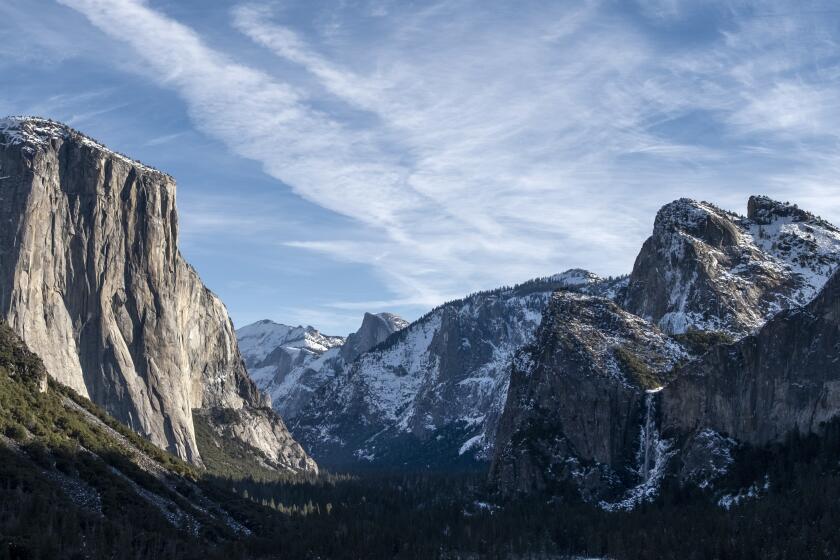Earth hits 6th warmest year on record, new measurements show

- Share via
Earth simmered to the sixth hottest year on record in 2021, according to several newly released temperature measurements.
And scientists say the exceptionally hot year is part of a long-term warming trend that shows hints of accelerating.
Two U.S. science agencies — NASA and the National Oceanic and Atmospheric Administration — and a private measuring group released their calculations for last year’s global temperature on Thursday, and all said it wasn’t far behind ultra-hot 2016 and 2020.
Six different calculations found 2021 was between the fifth and seventh hottest year since the late 1800s. NASA said 2021 tied with 2018 for sixth warmest, while NOAA puts last year in sixth place by itself, ahead of 2018.
Read all of our coverage about how California is neglecting the climate threat posed by extreme heat.
Scientists say a La Niña — natural cooling of parts of the central Pacific that changes weather patterns globally and brings chilly deep ocean water to the surface — dampened global temperatures just as its flip side, El Niño, boosted them in 2016.
Still, they said 2021 was the hottest La Niña year on record and that the year did not represent a cooling off of human-caused climate change but provided more of the same heat.
“So it’s not quite as headline-dominating as being the warmest on record, but give it another few years and we’ll see another one of those” records, said climate scientist Zeke Hausfather of the Berkeley Earth monitoring group that also ranked 2021 the sixth hottest. “It’s the long-term trend, and it’s an indomitable march upward.”
Gavin Schmidt, the climate scientist who heads NASA’s temperature team, said “the long-term trend is very, very clear. And it’s because of us. And it’s not going to go away until we stop increasing the amount of carbon dioxide in the atmosphere.”
In a worst-case emissions scenario, half of the valley’s eight counties will have average annual maximum temperatures over 80 degrees by 2100.
The last eight years have been the eight hottest on record, NASA and NOAA data agree. Global temperatures, averaged over a 10-year period to take out natural variability, are nearly 2 degrees (1.1 degrees Celsius) warmer than 140 years ago, their data shows.
The other 2021 measurements came from the Japanese Meteorological Agency and satellite measurements by Copernicus Climate Change Service in Europe and the University of Alabama in Huntsville.
There was such a distinctive jump in temperatures about eight to 10 years ago that scientists have started looking at whether the rise in temperatures is speeding up. Both Schmidt and Hausfather said early signs point to that, but it’s hard to know for sure.
“I think you can see the acceleration, but whether it’s statistically robust is not quite clear,” Schmidt said in an interview. “If you just look at the last the last 10 years, how many of them are way above the trend line from the previous 10 years? Almost all of them.”
The best we can hope for is incremental progress — two steps forward, one step back, a string of little victories.
The global average temperature last year was 58.5 degrees, according to NOAA. In 1988, NASA’s then-chief climate scientist James Hansen grabbed headlines when he testified to Congress about global warming in a year that was the hottest on record at the time. Now, the 57.7 degrees of 1988 ranks as the 28th hottest year on record.
Last year, 1.8 billion people in 25 Asian, African and Middle Eastern nations had their hottest years on record, including China, Nigeria, Bangladesh, Iran, Myanmar and South Korea, according to Berkeley Earth.
The deep ocean, where most heat is stored in the seas, also set a record for warmth in 2021, according to a separate new study.
“Ocean warming, aside from causing coral bleaching and threatening sea life and fish populations we rely upon for roughly 25% of our protein intake globally, is destabilizing Antarctic ice shelves and threatens massive ... sea level rise if we don’t act,” said study co-author Michael Mann, a Pennsylvania State University climate scientist.
The last time Earth had a cooler than normal year by NOAA or NASA calculations was 1976. That means 69% of the people on the planet — more than 5 billion people under age 45 — have never experienced such a year, based on United Nations data.
North Carolina state climatologist Kathie Dello, 39, who wasn’t part of the new reports but said they make sense, said, “I’ve only lived in a warming world, and I wish that the younger generations did not have to say the same. It didn’t have to be this way.”









